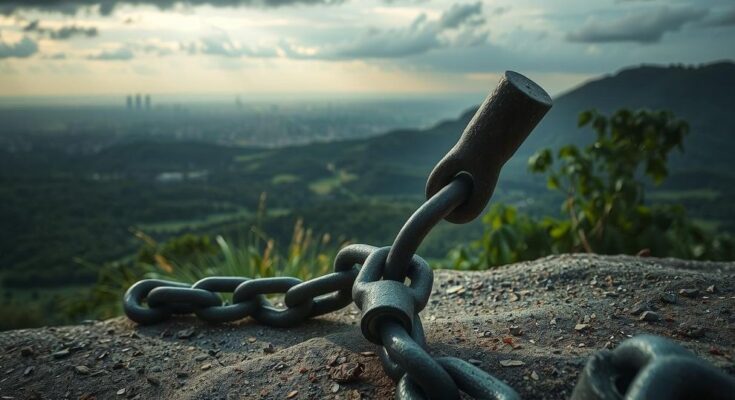There has been a significant escalation of conflict in eastern Congo as M23 rebels close in on Goma, overwhelming hospitals and displacing thousands. Schools have closed amid military preparations, and the recent death of a provincial governor highlights the battle’s intensity. The rebels have made substantial territorial gains while Rwanda’s potential involvement exacerbates regional tensions. Goma’s capture would have dire consequences for the local civilian population.
In recent weeks, the conflict in eastern Congo has escalated significantly, with M23 rebels encroaching on Goma, the last bastion of government authority in the region. As the rebels advance, local hospitals are overwhelmed with casualties, while thousands are displaced, further deepening the humanitarian crisis and raising alarm about a potential regional war.
Explosions have been reported near Goma, prompting school closures and heightened military presence. Tragically, the governor of North Kivu province died of injuries sustained at the front line. The rebels captured several strategic towns, including Sake and Minova, intensifying fears over Goma’s vulnerability to attack.
The M23 rebel group, formed in 2012, claims to protect Tutsi rights amidst ongoing conflicts over resources in the mineral-rich area. Observers assert that Rwanda’s support for the M23 underscores its intentions to exert control over eastern Congo’s resources, exacerbating tensions between the two nations.
Rwanda’s involvement in the conflict has amplified hostilities, with the U.S. and U.N. alleging Rwandan backing of the M23. Despite Rwanda’s denial, analysis indicates foreign troops on Congolese soil could escalate conflict, turning local skirmishes into broader warfare.
As combat spreads, over 400,000 people have fled their homes, worsening the living conditions in already overcrowded displacement centers and leading to health outbreaks. Displaced residents, like Jean Claude Bauma, express deep despair over the continuous cycle of violence.
Goma holds strategic importance for the rebels and the Congolese government, serving as a critical trade hub and humanitarian corridor. Past captures of Goma by M23 resulted in international backlash, which led to their temporary withdrawal.
The conflict in eastern Congo is a protracted crisis characterized by competition for control over lucrative mining areas and ethnic tensions involving groups such as the M23 rebels. This group emerged after failed efforts to integrate disaffected Tutsi communities into the Congolese military, leading to accusations that Rwanda is using them as proxies to exert control over the region’s resources. The stakes of Goma’s fate are particularly high, as its capture could reset power dynamics in eastern Congo and potentially draw in wider regional conflict. With various armed groups operating in the area, the situation has been compounded by historical grievances, shifting alliances, and external influences that threaten to destabilize not just Congo, but the Greater Lakes Region of Africa.
The escalating violence in eastern Congo, intensified by M23’s advance towards Goma, poses grave humanitarian implications and heightens regional tensions. The involvement of Rwanda raises questions about sovereignty and foreign intervention, while the displacement crisis continues to grow. As the situation remains volatile, the potential for significant civilian suffering increases, underscoring the urgent need for international attention and intervention. In summary, the ongoing conflict demands a critical response to avert a larger humanitarian disaster and foster a stable resolution to the underlying issues driving the violence.
Original Source: apnews.com




